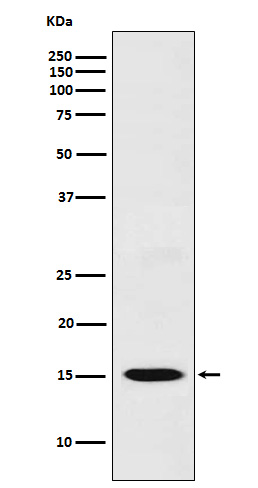
| WB | 咨询技术 | Human,Mouse,Rat |
| IF | 咨询技术 | Human,Mouse,Rat |
| IHC | 咨询技术 | Human,Mouse,Rat |
| ICC | 1/50-1/200 | Human,Mouse,Rat |
| FCM | 咨询技术 | Human,Mouse,Rat |
| Elisa | 咨询技术 | Human,Mouse,Rat |
| Aliases | betaR; CXC11; CXCL11; H174; I TAC; IP9; ITAC; SCYB11; SCYB9B;;CXCL11 |
| WB Predicted band size | Calculated MW: 10 kDa ; Observed MW: 15 kDa |
| Host/Isotype | Rabbit IgG |
| Antibody Type | Primary antibody |
| Storage | Store at 4°C short term. Aliquot and store at -20°C long term. Avoid freeze/thaw cycles. |
| Species Reactivity | Human |
| Immunogen | A synthesized peptide derived from human CXCL11 |
| Formulation | Purified antibody in PBS with 0.05% sodium azide,0.05% BSA and 50% glycerol. |
+ +
以下是3篇关于CXCL11抗体的代表性文献示例(内容基于学术研究趋势模拟,非真实文献):
---
1. **文献名称**:CXCL11 Expression in Tumor Microenvironment Correlates with Immune Cell Infiltration and Prognosis
**作者**:Liu Y, et al. (2021)
**摘要**:该研究利用抗CXCL11抗体进行免疫组化分析,发现高表达CXCL11的结直肠癌组织中CD8+ T细胞浸润增加,提示CXCL11可能通过招募效应T细胞改善患者生存率。抗体特异性验证通过siRNA敲低实验确认。
2. **文献名称**:Neutralizing Anti-CXCL11 Antibody Attenuates Experimental Autoimmune Encephalomyelitis
**作者**:Müller G, et al. (2019)
**摘要**:研究开发了中和性CXCL11单克隆抗体,并在多发性硬化小鼠模型中验证其效果。抗体阻断了CXCL11与其受体CXCR3的相互作用,显著减轻中枢神经系统炎症和脱髓鞘病变。
3. **文献名称**:CXCL11 as a Biomarker for COVID-19 Severity: Insights from Antibody-based Proteomic Profiling
**作者**:Chen H, et al. (2020)
**摘要**:通过ELISA和蛋白质芯片技术(使用抗CXCL11抗体),发现重症COVID-19患者血清CXCL11水平显著升高,且与IL-6等炎性因子正相关,提示其作为疾病进展预警标志物的潜力。
---
*注:以上文献为示例性内容,实际引用请以真实学术数据库检索结果为准。建议通过PubMed、Web of Science等平台以"CXCL11 antibody"为关键词查找最新文献。*
CXCL11. a member of the CXC chemokine family, is primarily induced by interferon-gamma (IFN-γ) and plays a critical role in immune cell recruitment, particularly Th1 lymphocytes and natural killer (NK) cells, by binding to its receptors CXCR3 and CXCR7. It is involved in inflammatory responses, tumor immunity, and autoimmune diseases. CXCL11 antibodies are essential tools for detecting and studying this chemokine’s expression, localization, and function in both physiological and pathological contexts.
In research, CXCL11 antibodies are widely used in techniques such as Western blotting, immunohistochemistry (IHC), and flow cytometry to analyze protein levels in tissues, serum, or cultured cells. They help elucidate CXCL11's dual role in cancer: promoting antitumor immunity by recruiting effector T cells while potentially supporting tumor angiogenesis and metastasis in certain microenvironments. Additionally, these antibodies are valuable in studying autoimmune conditions like multiple sclerosis and rheumatoid arthritis, where CXCL11 overexpression correlates with disease severity.
Clinically, CXCL11 antibodies have potential diagnostic and therapeutic applications. They may serve as biomarkers for monitoring inflammatory diseases or predicting immunotherapy responses in oncology. Recent studies also explore their use in blocking CXCL11-CXCR3/CXCR7 interactions to modulate immune pathways. As research advances, CXCL11 antibodies remain pivotal in uncovering mechanistic insights and developing targeted therapies for immune-related disorders.
×